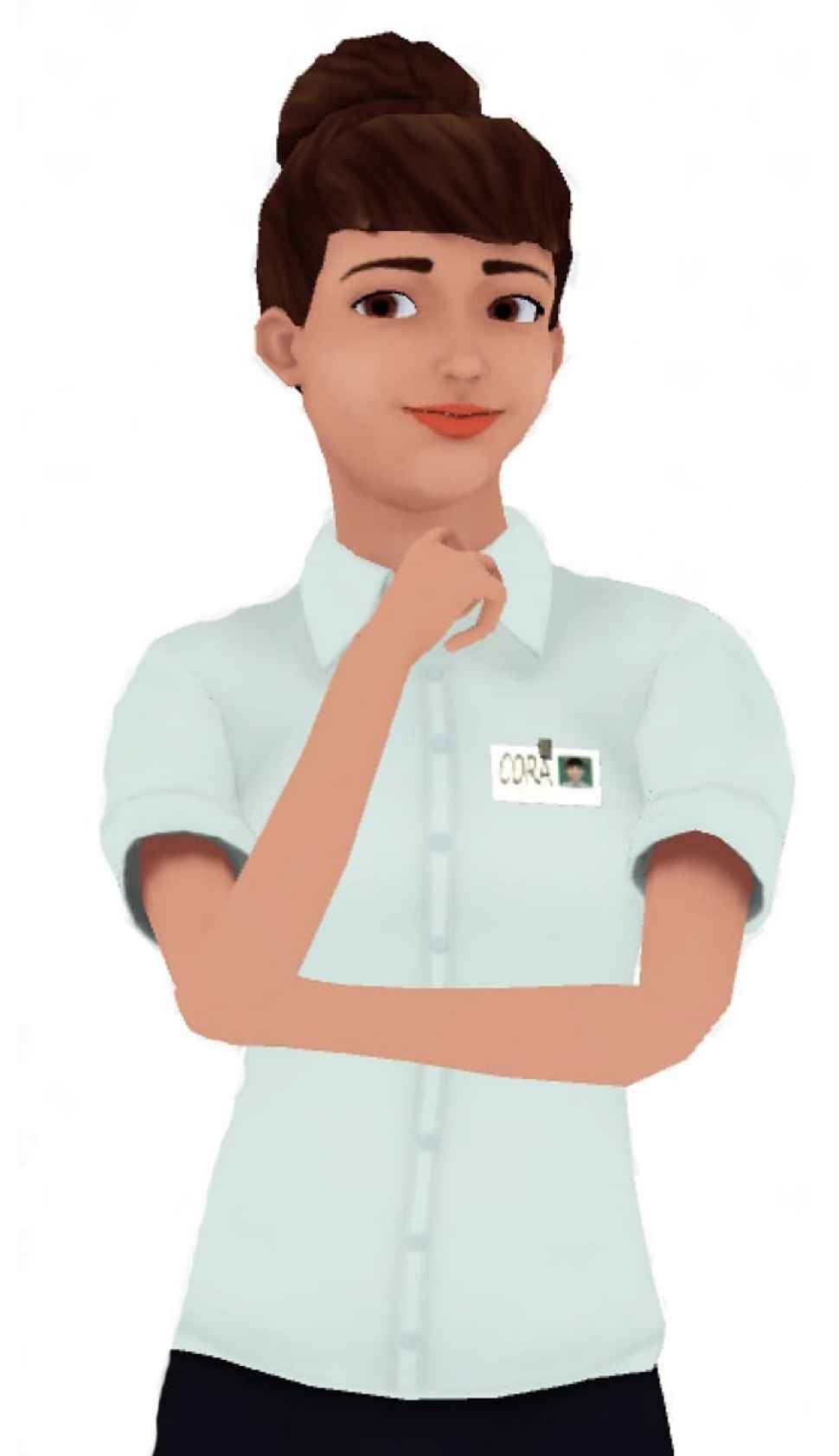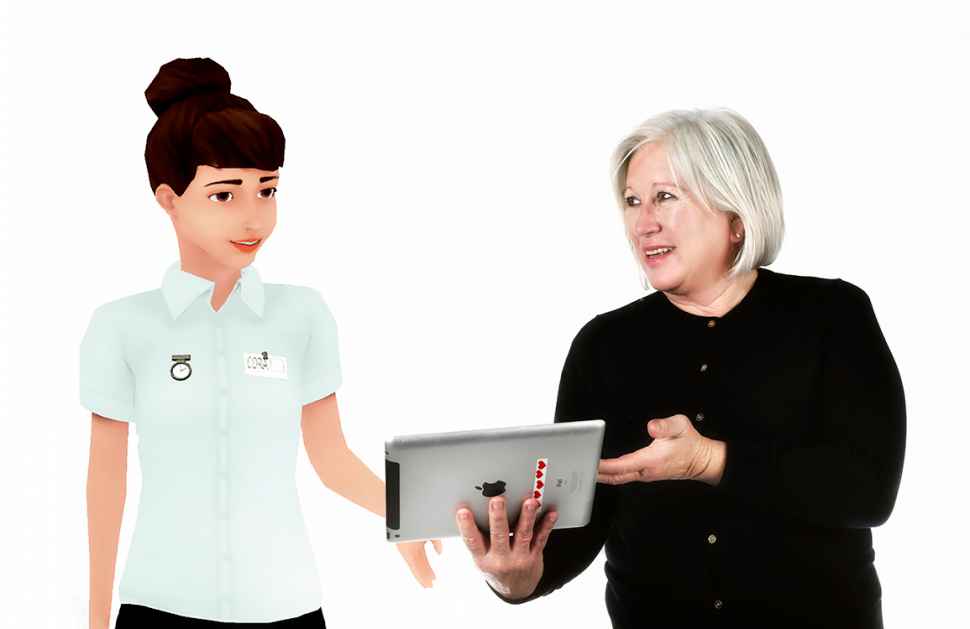The avatar nurse improving Australia’s heart health
Rural and regional health
Cora is a cardiovascular nurse who is able to help patients all across Australia and speaks 144 languages.
Oh, and Cora is an avatar.

Five years ago heart health expert, Professor Robyn Clark, her research team (Dr Hui Du and PhD student Jinny Tongpeth) and animation and interactive design studio, Monkeystack, teamed up to create Cora and solve a national health crisis. Cardiovascular disease is the single largest killer of Australians. Around 50% of people who suffer one heart attack will have another. What’s strange is that people who have suffered one heart attack are no less likely to be prepared, know what to do, and take the correct actions the next time the warning bells sound.
Together, Robyn, her team and Monkeystack have brought together years of health, education and game design research to develop Cora: an interactive app that guides users through information and quizzes, teaching people who have had a heart attack what to do if the symptoms appear a second time.
Patients currently receive a bedside explanation from a nurse and a 140-page booklet from the Heart Foundation. But the message isn’t sinking in and nurses face challenges like too little time available for patient education, low patient health literacy, language barriers and patient apathy. With all these pressures, nurses could never be as word-perfect, multilingual or generous with their time as Cora.

For users with hearing or language difficulties, every lesson is written on the screen, spoken by Cora, and supported with a photograph. Plus there are plans to translate Cora into over 144 languages—including many Aboriginal and Torres Strait Islander languages. The result is an app that cuts through the challenges of communicating in a multicultural and increasingly aged society of diverse literacy levels and health care knowledge.
There’s also the fact that Cora is fun. ‘It’s not the same as having a lecturer,’ Robyn explains. ‘You have to interact with her.’ She gamifies learning about heart attacks, so that patients not only want to use Cora—but they’ll want to show her to friends and family at Sunday lunch. When Monkeystack first said, ‘It’s pretty serious and not much fun,’ Robyn was apprehensive. Heart attacks aren’t meant to be fun. But the team at Monkeystack persisted and showed Robyn how serious games can work to incorporate engaging quizzes and rewards to make the user feel good about learning. Now Robyn gushes with pride at the reaction of users.
The second time around you would think people who’ve had a heart attack before would go quickly to hospital… Not true. The research shows that they don’t go any quicker than the first time round. Instead they wait, hoping that the heart attack symptoms will go away, thinking maybe it’s indigestion… I’ll just wait 10 minutes… I don’t really want to go to hospital or bother the ambulance people. They go into denial, they bargain and they delay, delay, delay.
Professor Robyn Clark
The development of Cora has taken on feedback at every stage. She has dark hair, brown eyes and olive skin, and she is a healthy size 12. Nurses wanted her hair a little messier—more realistic. Monkeystack wanted to give her more humanoid movements, so they teamed up with the Rehabilitation and Motion Analysis Lab at Tonsley. Cora can now fidget impatiently when users leave the screen unattended and celebrate with a few claps and a smile when they get an answer right. Elderly users wanted the app buttons to be bigger.
All of the team’s efforts and adjustments have proved worthwhile. PhD student, Jinny, found that after a six-month trial, users demonstrated a 15% increase in knowledge and 24% increase in symptom recognition. They also enjoyed using the app, which we know from an impressive 87.3% level of satisfaction. From follow-up surveys, Jinny found that the group that used the app were more likely to call an ambulance when they experienced symptoms (89% as compared to 43%) and they spent less time in hospital for heart health (3.6 days compared to 6.4 days on average). When you search for heart attack education apps, there might be a few hundred or even thousand—but only one or two are scientifically tested. This is what makes Cora special.
One patient was vomiting and nauseated, so at first an ambulance gave her a low priority. She didn’t realise these were her heart attack symptoms. After using Cora, she recognised her symptoms and felt empowered to say 'Oh yes, this is me.' Now she knows to say 'I’ve had a heart attack before, I’m having the same symptoms and I need an ambulance right away.' It may save her life.
Professor Robyn Clark
With the success of Cora, the team are now working to develop her parents: Bob and Mary. Bob and Mary have heart failure—a condition that requires constant management and life adjustments like taking your medicine, going for walks, eating healthily, taking precautions when travelling, weighing yourself. For this type of behavioural change, research shows that peer teaching is most effective; many people get health advice from their friends. So Robyn’s team and Monkeystack have created a companion app with Mary and Bob, speaking directly to women and men about the changes they should make. Users can customise Bob and Mary to look just like them. It’s a bit like playing The Sims—without quite so many earring choices (The team were surprised to receive one user’s suggestion about wanting a selection of earrings for Mary).
Robyn is also working on an emergency app to sit alongside Cora. The app will have one button that users should press if they’re having a heart attack. It will automatically call two numbers: an ambulance and a loved one.
Robyn has always wanted to be Princess Leia from Star Wars. She loves the idea of R2D2 taking Leia’s message to places she couldn’t reach—which is where Robyn draws inspiration for Cora going into patient’s homes to teach them about their health. She’s excited about bringing games into the clinical environment. She explains, ‘Hospitals are so far behind how people communicate when they step out the door. I’m really excited to be part of the journey to bring 21st century communication into regular clinical practice.’
Once Cora is translated, the team plans to work with the Heart Foundation to distribute and promote the app. It is hoped that Cora will lead to a long line of evidence-based apps to bring our health literacy into the twenty-first century and, ultimately, help save lives.
Fast Facts
- During a heart attack every minute counts.
- People with coronary heart disease (CHD) are at greater risk of heart attack than the general population.
- Mortality and morbidity associated with heart attacks in people with CHD could be substantially reduced if they recognise and act upon the warning signs quickly.
- More than 50% of heart attack deaths occur before the person reaches hospital. Research conducted by the Heart Foundation confirms that many people, including people with CHD, wait too long before seeking treatment for a heart attack. Furthermore, just under 50% of people arrive at hospital emergency departments by ambulance.
- In research funded by the Heart Foundation, Cora is one of the very few educational apps that has been scientifically proven to be effective in improving knowledge and response to a heart attack in a randomised controlled trial.
- The development of Cora supports local industry and collaboration—with South Australian researchers, clinicians, developers and designers working together to create the avatar.
- The PhD project associated with the app development has been published in a high ranking journal and presented in international prize sessions.
Professor Robyn Clark is an internationally-recognised senior clinician and mid-career researcher. She holds qualifications as a registered nurse, registered midwife and critical care nurse, and a master’s degree in education and a PhD. Professor Clark was the inaugural recipient of a National Institute of Clinical Studies PhD scholarship (supported by the National Heart Foundation) for researching telemonitored heart failure management in rural and remote Australia. She is currently a Heart Foundation Future Leader Fellow, a fellow of the Royal College of Nursing, fellow of the American Heart Association, and life member of the Australian College of Critical Care Nurses. She holds adjunct appointments at the University of South Australia, Queensland University of Technology and the South Australian Health and Medical Research Institute (SAHMRI).
Medical devices and assistive technologies homepage
Discover more research
Research that puts you to sleep (in a good way)
Bringing smart technology to the humble t-shirt
Breath testing for a deadly cancer
![]()
Sturt Rd, Bedford Park
South Australia 5042
South Australia | Northern Territory
Global | Online


